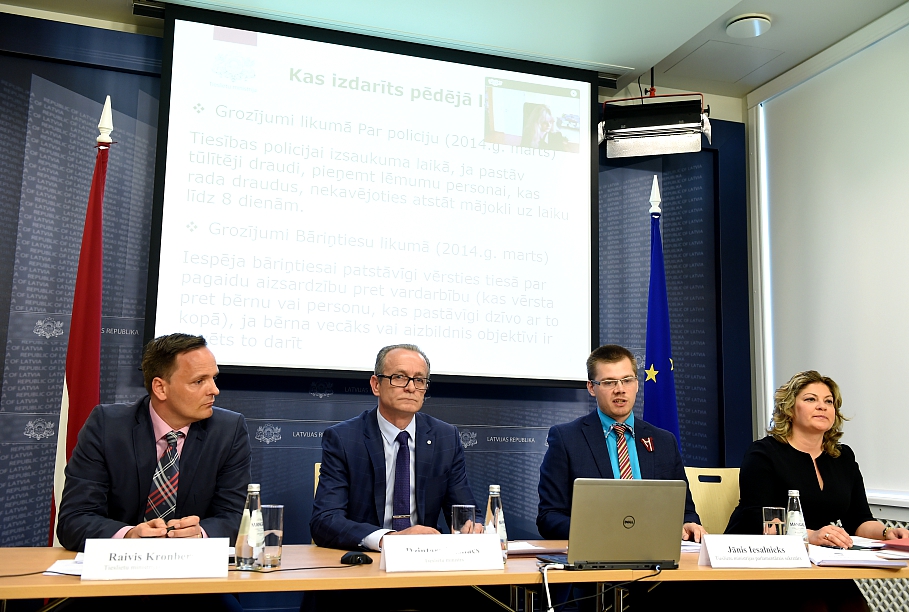Unfortunately the plucky underdog in this case - Latvia, or more specifically the Justice Ministry - runs the risk of being portrayed not as a defender of the vulnerable but as a defender of thugs, bullies and wife-beaters.
The hot topic on the political scene is whether or not Latvia will sign the Council of Europe's Istanbul Convention, designed primarily to introduce an international framework to tackle violence against women.
At a May 9 press conference Justice Minister Dzintars Rasnacs outlined what he said was a principled stand against an onslaught of forces described variously as both "neo-Liberal" and "neo-Marxist" but is also transparently an attempt by the National Alliance to ape the success of the Law and Justice Party in Poland.
It should be noted Rasnacs repeatedly stated his opposition to domestic violence and his determination to tackle the problem. He also said "only" 13 EU member states had ratified the convention, though all except Latvia have signed it.
However, it is unclear what is meant by either of the terms above. Neo-liberalism presumably is the same as old liberalism, just newer. It is difficult to see what particular threat this poses.
Regarding neo-Marxism I have scoured the text of the Istanbul Convention diligently yet I have found nothing at all relating to the redistribution of wealth, controlling the means of production or the inevitable triumph of the working class, so we must simply assume these are vague terms designed to alarm the general population.
Luckily that population has religion to fall back upon. According to Rasnacs at the May 9 press conference, the opposition of Christian leaders to signing the Istanbul convention is a decisive factor. They represent 1.5 million people or three quarters of the population he claimed.
Quite apart from the fact that this is clearly hogwash (visit a few local churches next Sunday and see how many people are there or ask them which is more imporant, pagan Midsummer or Easter) it sets an extremely dangerous precedent. Assigning political authority over three quarters of the population to unelected clergymen is a shocking derogation of duty by a minister and a danger to the concept of the secular state.
Next time a controversial topic arises, perhaps the cabinet or Saeima should turn it over to the bishops to decide. If they really do have a mandate of 1.5 million they have more legitimacy than the parliament itself. Plus of course, God is on their side in his various denominationally different ways. A full-scale return to the theocracy of Terra Mariana might be a good idea, though it would require tearing up the constitution which is supposedly threatened by the Istanbul Convention.
The other striking feature of the press conference was the rambling denunciation of the text of the Istanbul convention itself by Baiba Rudevska, who authored the Justice Ministry's "legal analysis" of the document. Speaking via video link from Germany, her on-screen image was initially of a Siamese cat, giving the novel impression that the Ministry was receiving feline legal advice. That technical glitch was quickly resolved and journalists were able to watch in stunned silence as the lawyer, sporting sunglasses throughout, lambasted the text of the convention as being of "extremely low quality".
Now despite Rudevska's bizarre delivery, here I have some slight sympathy with her. The text of the convention is indeed littered with trendy, politically-correct terms, but these to my untrained eye seem to have extremely limited actual legal force. In fact they are terms that mirror "neo-liberal" and "neo-Marxist" in their amorphous nature. They do not seem like phrases with a very long shelf-life: "structural nature of violence", "socially constructed roles", "holistic response" and so on.
Yet quite apart from the unlikely scenario that Rudevska actually has identified legal failings unidentified by the teams of constitutional lawyers from dozens of other Council of Europe member states, some of the arguments deployed are bizarre in the extreme. If actually expressed on the international stage, instead of to the intended audience of domestic voters, these arguments will present Latvia as some sort of reactionary Ruritania in which a modern attempt to tackle the centuries-old, global problem of men hitting women is rejected because it is seen as a stain on national honor.
As well as being absurd, the argument that Latvians could not regard their freedom fighters with honor if they agreed that at in the past men have oppressed women, also sets a surreal precedent.
If Latvia cannot sign up to the Istanbul Convention because to do so would impugn the purity of our notion of freedom fighters, perhaps Latvia should not have signed up to the Council of Europe's previous convention on foreign fighters - including the Riga Protocols signed in the Latvia capital? After all it could be argued that the Latvian Riflemen of the First World War and the Latvian Legion of the Second World War were - in pure legal terms and at times - fighting for foreign powers.
How to honor their memory under such circumstances?
Yes, all of the above is complete flim-flam. Ultimately the only question that really matters regarding the Istanbul convention is: "Will it stop women being punched in the head?" I don't think even its most enthusiastic neo-Marxist, neo-Liberal, gender-non-specific, biodegradable supporters would argue that it will put a stop to such violence.
But if it helps even slightly, if it makes any man anywhere (not only in Latvia) think twice about that "traditional" slap in the face, if it gives one woman one degree more confidence to report domestic violence, it must surely be worth signing up to.
By now Latvia is big enough and strong enough to turn the other cheek and wait for a battle really worth fighting.



































